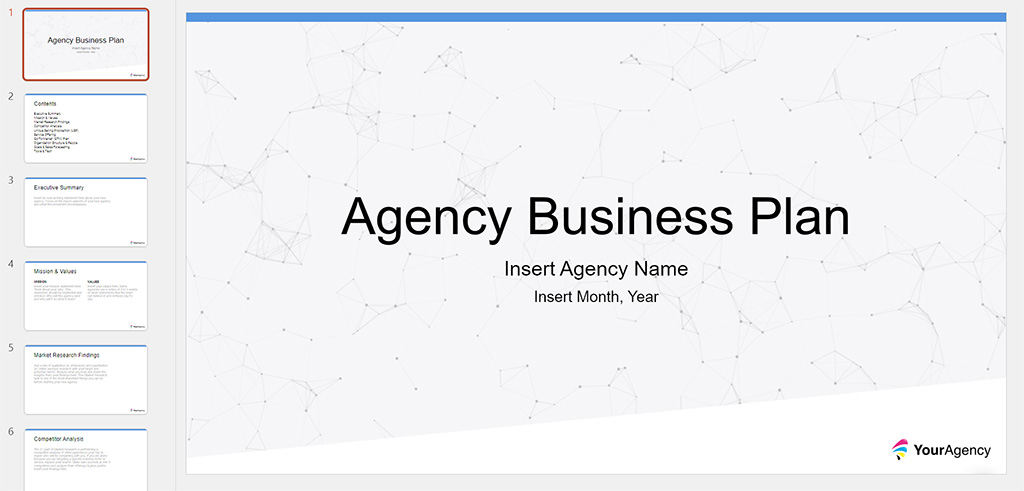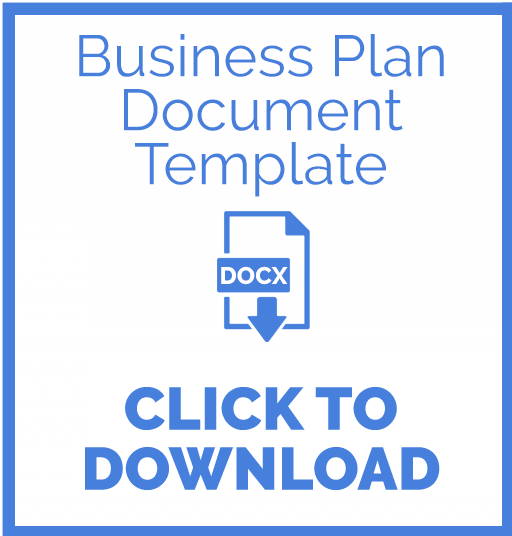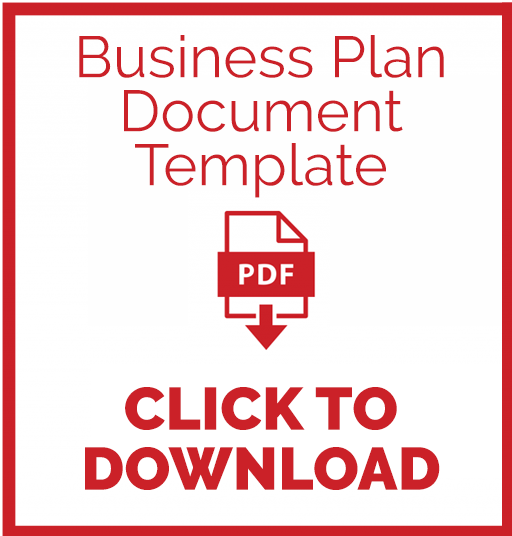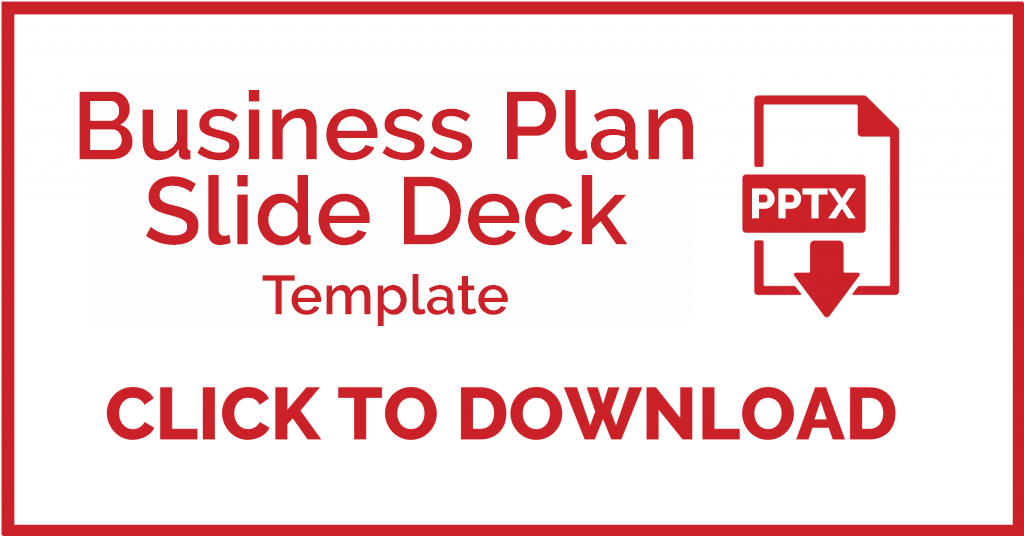
SEOptimer now serves over 2,000 digital agencies around the world and through the years we've had the chance to connect with many of our agency customers to understand their early days in starting their agency. This is incredibly interesting to us because it helps us understand where and how they plan to grow so we can help build the features they need in SEOptimer.
This article is the 3rd in our series focused on starting a new digital agency. For some useful prior reading be sure to check out our previous articles:
- How to Start a Digital Marketing Agency: a comprehensive guide covering typical agency business models, services, hiring, training, new business, day to day management and more!
- Digital Agency Lean Canvas: a digital agency business model on a single page! The lean canvas is a popular documentation methodology borrowed from the tech startup world.
Don't be dismayed if it feels like there's a lot of other competing digital agencies in your city. This is perfectly normal. Digital marketing services like local SEO, for example, are dominated by small agencies. Search Engine Land reported that over 50% of local SEO agencies have 10 or fewer clients. Forbes Council Member Jon Hall says, this keeps the industry "weird" - aka diverse as its not dominated by a small handful of big agencies.
The first step in launching a new digital marketing agency is to write a plan. In this guide, we'll cover two of the more traditional ways to define a business plan document with handy downloadable templates:
Why do you need a Digital Marketing Agency Business Plan?
The days of mandatory 50+ page business plans are long gone. The choice is now yours as to whether you define your digital agency business plan in an in-depth strategic document or not. Some agency founders find it useful to brainstorm this way and document their thought process in a long-form fashion across many pages. Other founders prefer creating shorter slide decks, others opt for a 1-page lean canvas version or some even write their plan in a wiki or business planning tool.
There is no right or wrong way to document your plan. You need to find the documentation method that suits you best. If you're unsure what suits you best, the following factors may help you decide:
Consideration #1: Who is the audience?
Think about who this document is for. Who will read it? In some cases it will just be you and the founding team. If you are raising money, obviously your investors will be a key audience.
You might also have business partners or board members who may be an audience too. When thnking through all these different groups, work backwards from the most optimal presentation format.
Consideration #2: Seek an unbiased third-party opinion
Devin Schumacher is the Founder of SEO agency SERP and says it's easy to get swept up in your own overly optimistic projections.
"Ask an experienced agency founder you trust or admire to sanity-check your plan. Seeking an objective opinion from a third-party detached from your new business is vital."

Devin makes a great point. This type of peer review methodology is commonplace in other industries but sometimes lacking amongst agency founders. Make sure you get at least 1 other unbiased opinion from someone who has already achieved success in your niche.
Don't fall into the trap of asking a friend or your accountant or someone you know personally to review your plan. Doing so will give you a biased opinion. You need an unbiased opinion from someone willing to give you objective feedback.
Consideration #3: Stand your ground
The whole point of a business plan is to take the time and effort to research the market, your competitors and potential clients. This document will distill all your insights into a strategic plan you can operationalize. As is always the case, unexpected distractions masquerading as opportunities (rightly or wrongly) will pop up in your field of view demanding your attention.
Perhaps it's a new client opportunity with a project slightly adjacent to your niche. Perhpas a hiring opportunity for a role you didn't plan to hire yet. Sometimes the hardest thing is to say no, when you're in the mindset of taking every opportunity for growth.
During these situations, revisit your agency business plan and remind yourself of your focus area niche and how you planned to grow within that niche.
Consideration #4: But, be ok with change
 Somewhat contradictory with the previous point but absolutely part of the process, Rebekah Edwards, Co-Founder of SEO agency Clara says you need to be ok with making plans and expecting them to change. There's no shame in pivoting.
Somewhat contradictory with the previous point but absolutely part of the process, Rebekah Edwards, Co-Founder of SEO agency Clara says you need to be ok with making plans and expecting them to change. There's no shame in pivoting.
In fact this balance between sticking to the plan and pivoting the plan needs to be navigated by every digital agency founder. It's not easy and often you will be second-guessing yourself.
"Every agency owner I know has had to massively adjust their target audience, pricing structure, competitor analysis, and service offerings based on the way they grow over the first 2-5 years."
Rebekah says that founders need to be prepared for change, afterall, digital marketing is in constant flux and evolution, so change is the norm and we need to write business plans with flexibility in mind.
Trust your performance metrics and continue to do the things that have the biggest quantifiable business impact.
Typical Business Plan structures
We mentioned previously that there's no right or wrong way to document your business plan. So with that said, let's look at some typical marketing agency business plan templates that you can use. After considering all the factors above, choose the structure that works for you and your stakeholders best. We've outlined six of the more common options below:
Option #1: Written business document
This is the more traditional (and still valid) way to describe your business. A written business plan document in MS Word or Google Docs is still the most common way to document your digital marketing agency business plan.
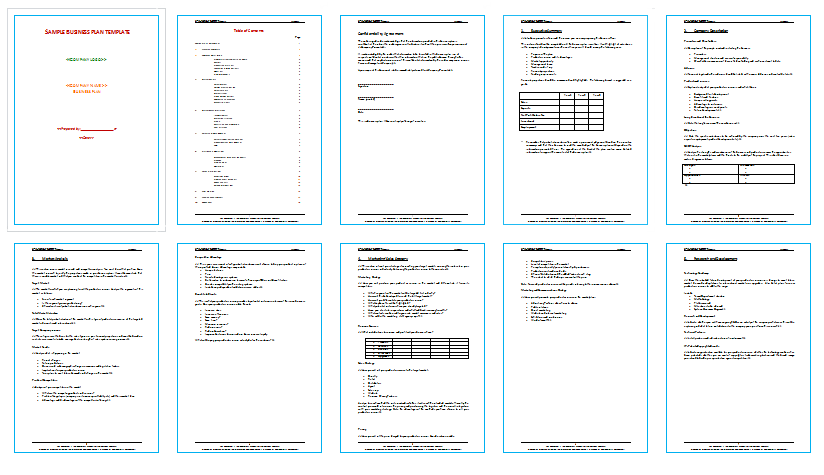
This type of business plan is considered "long-form", ie: longer in length and suited to more descriptive language. Expect to write longer rationales, longer explanations with plenty of space for evidence, research, insights and strategy. This type of plan will likely be 30+ pages and feel comprehensive. This comprehensiveness is especially needed if external investors or business partners are involved who need to be convinced of the robustness of your plan.
Option #2: Slide deck
The PowerPoint Presentation (or Google Slides or Keynote) has become the go-to corporate communication format. Digital agency founders spend most of their time communicating to staff, clients and stakeholders in PowerPoint so it makes sense to use this format for the purposes of communicating the agency's overall business plan.
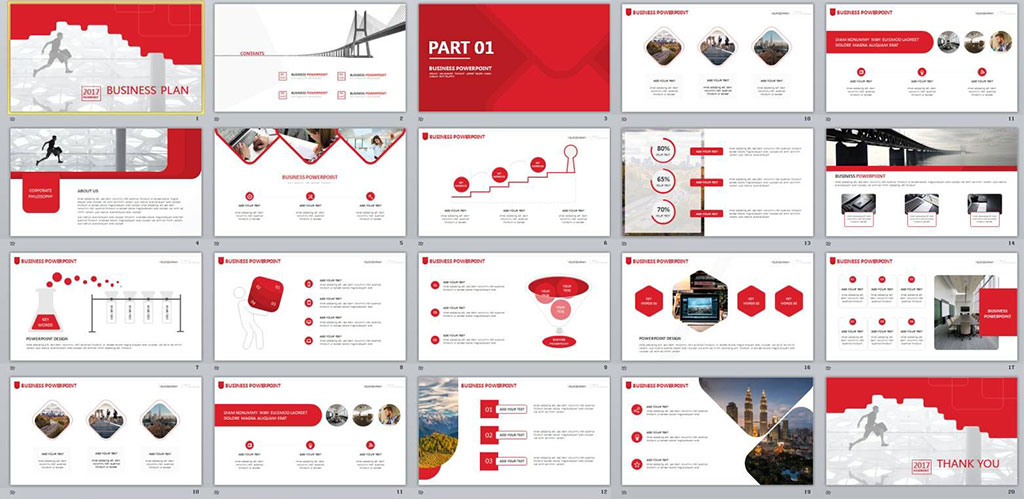
The fundamental difference between this option and the written document, is that a slide deck is a presentable format. So typically you might be in the room with your business partners, walking through the presentation on the screen. Whereas in option #1, a written document is not a compelling way to present an idea. It's much more suited as a sent document to be consumed in isolation. That's not to say that a slide deck can't be utilized this way, it's just more common that you would be presenting and talking through your plan with the slides serving as a visual backup to what you say.
There's also a good argument for doing both (ie written document AND slide deck). It comes down to who all the stakeholders are (eg investors, business partners or just you) and whether you intend to present your plan or just document your plan.
Option #3: Lean canvas
The Lean Canvas developed by leanstack.com is a business plan on a page split into 10 boxes. This planning document has become very popular in the tech/startup world and has since been adopted in many other industries, including digital agencies. Be sure to check out our previous article explaining how to use a Lean Canvas for your agency.
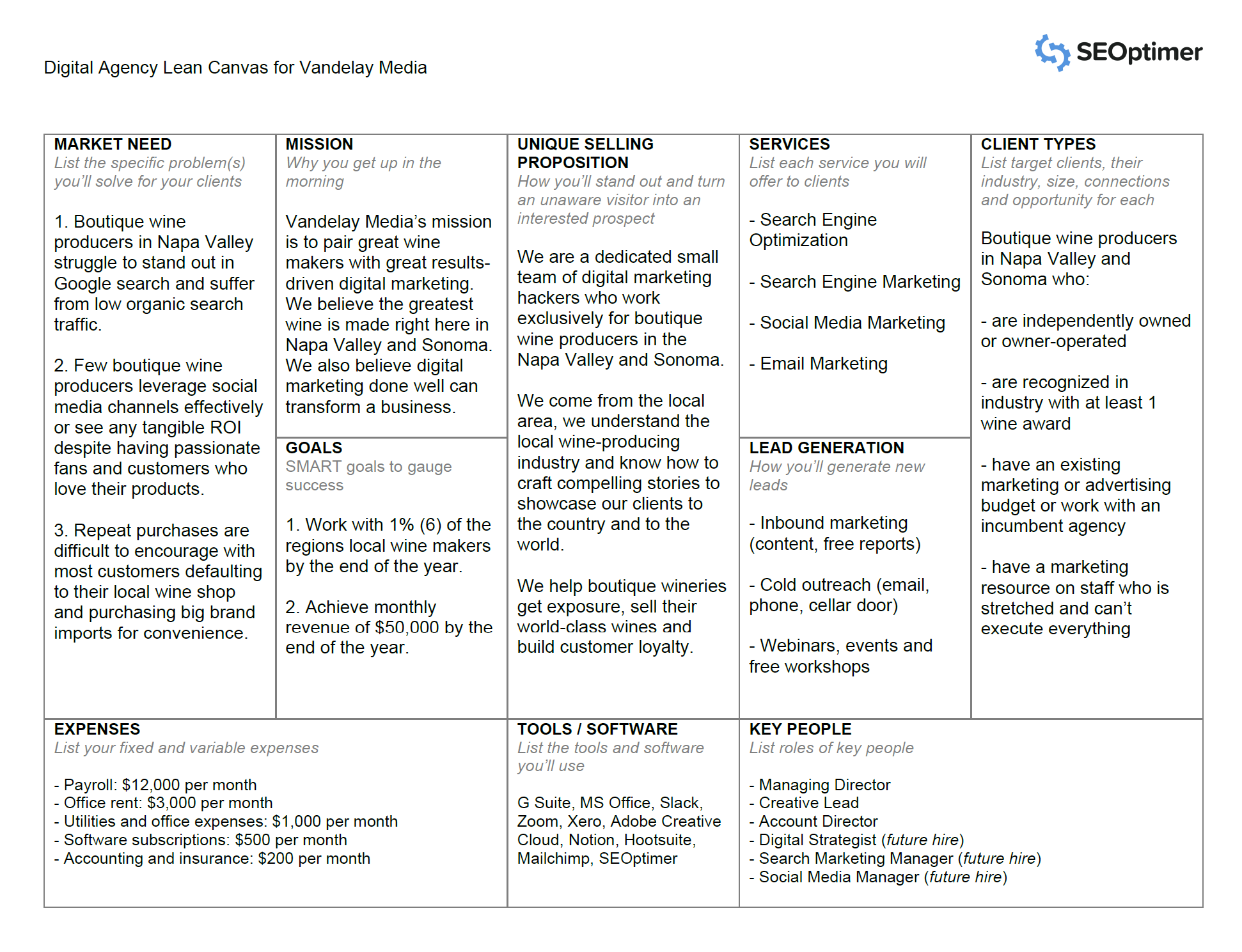
The entire business plan fits on a single page which means you obviously need to sweat on every single world and ensure only the most important details are included. We are big supporters of this format because this helps you prioritize and focus your efforts down to the fundamental aspects of your new business.
Option #4: Wiki
In the context of a business, a Wiki is usually an internal website with multiple interlinking articles. The biggest Wiki in the world is Wikipedia and if you want to get really meta, check out Wikipedia's wiki about wikis:
"A wiki (/wɪki/ WIK-ee) is a hypertext publication collaboratively edited and managed by its own audience directly using a web browser. A typical wiki contains multiple pages for the subjects or scope of the project."
Wiki's are generally perceived as internal knowledge bases so if your business plan has executional detail, this might be a good format for documenting processes and methodologies for staff.
Option #5: General Planning tool
Tools like Notion and Trello have grown massively in recent years as more people are working remotely and more work in general is being done collaboratively online.
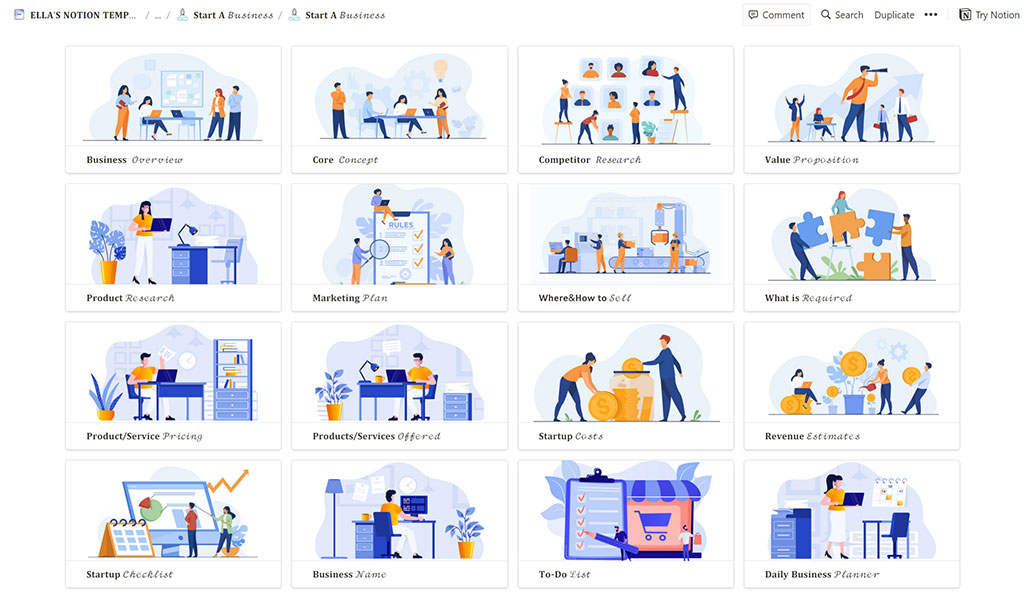
These types of planning tools are designed to be multi-purpose and fall somewhere between a wiki and a specialized business planning tool.
How to construct the business plan
Now that we've covered the typical business plan structures let's look at the specifics of how you actually go about constructing the business plan and each of the main tasks you need to perform and sections of the business plan.
Market research data gathering
Customer/client research
Rebekah Edwards, who we spoke to previously stresses the importance of market research with as many potential clients as you can. She interviewed several businesses in their target market when developing their service offerings and pricing. Some of the questions she thought were most helpful included:
- With no other information, what do you think X would cost from an agency? (X being the service in question.)
- What is the biggest roadblock for you to accomplish X in-house? (X being basic content/SEO projects, such as article creation/editing/uploading or strategizing new keywords.)
- How would you typically search for a digital marketing agency? (Referrals, social media, Google search, etc. — this helped us understand how to best market our services)
- If you already work with a digital marketing agency of any kind, what stood out? Why did you sign on the dotted line?
- Have there been digital marketing agencies you've specifically decided not to work with for any particular reason? What were the red flags or the issues with a fit that led you to say no?
- What matters most to you when working with a digital marketing agency? (Examples: data/analytics, frequent communication, hitting deadlines every time, price, niche of expertise, etc.)
Answers to these questions are invaluable as they help you position and market your new digital agency based on customer insight.
Competitor research
The importance of competitor research goes without saying. It's vital you have a good understanding of how your competitors are going to market, how they sell, who they target and what their rough price points are. If you have a friend who owns a small business, ask them to mystery shop at a competitor so they can report back to you what the sales process was like.
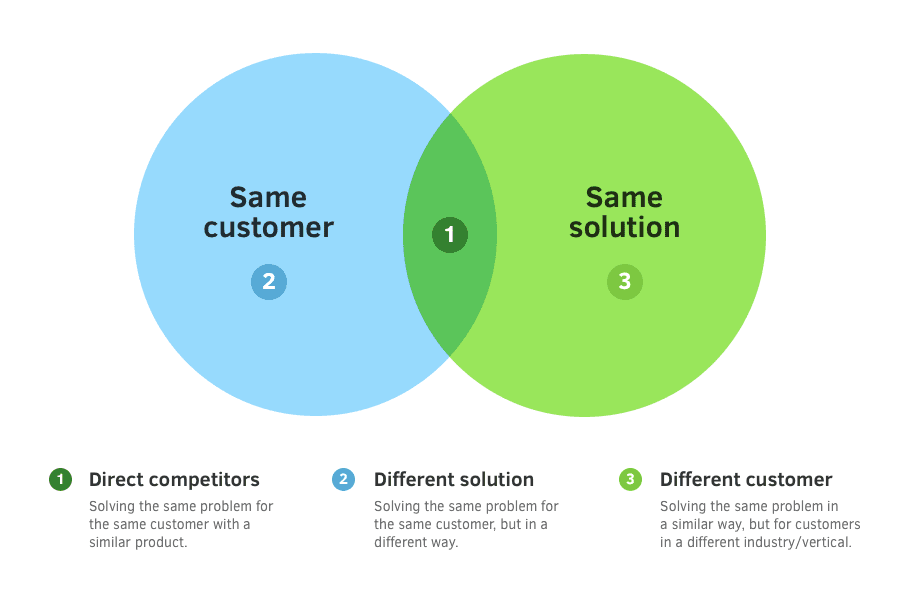
The way you position and sell your services should be informed by a combination of both customer insights and competitor insights. Addressing client needs whilst maintaining a unique selling proposition will set your new digital agency up for success!
Building out the business plan
Download our template!: Digital Marketing Agency Business Plan Document
To make edits to the document make sure to download our DOCX template which you can edit directly in Microsoft Word. However if you would prefer a printable PDF, we also provide this option too. Use these templates as a starting point to help you draft your digital marketing business plan:
Below are some of the highlight areas of the plan:
Market Research Findings
We suggest conducting three types of research to inform your marketing agency business plan:
- Qualitative research like one-on-one interviews, focus groups and meetings with prospective clients
- Quantitative reserach like online surveys, mass emails and multivariate testing
- Competitor analysis to determine their strengths and weaknesses
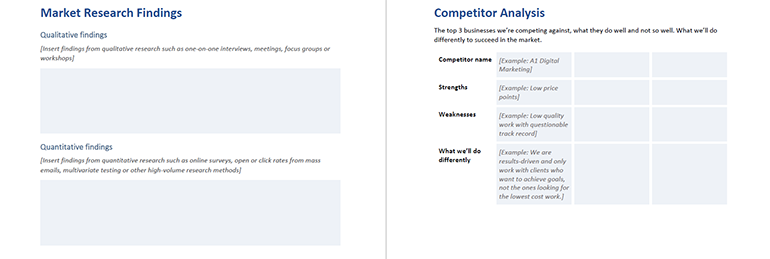
Unique Selling Proposition (USP) and Service Offering
Nailing your USP will be tough especially if you are in a competitive industry / city. Use the previous market research tasks to discover where the gaps are in the market and leverage these insights to position your new agency to be competitive AND different. Perform a SWOT analysis based on your new USP. Then you can determine your actual service offerings and pricing strategy.
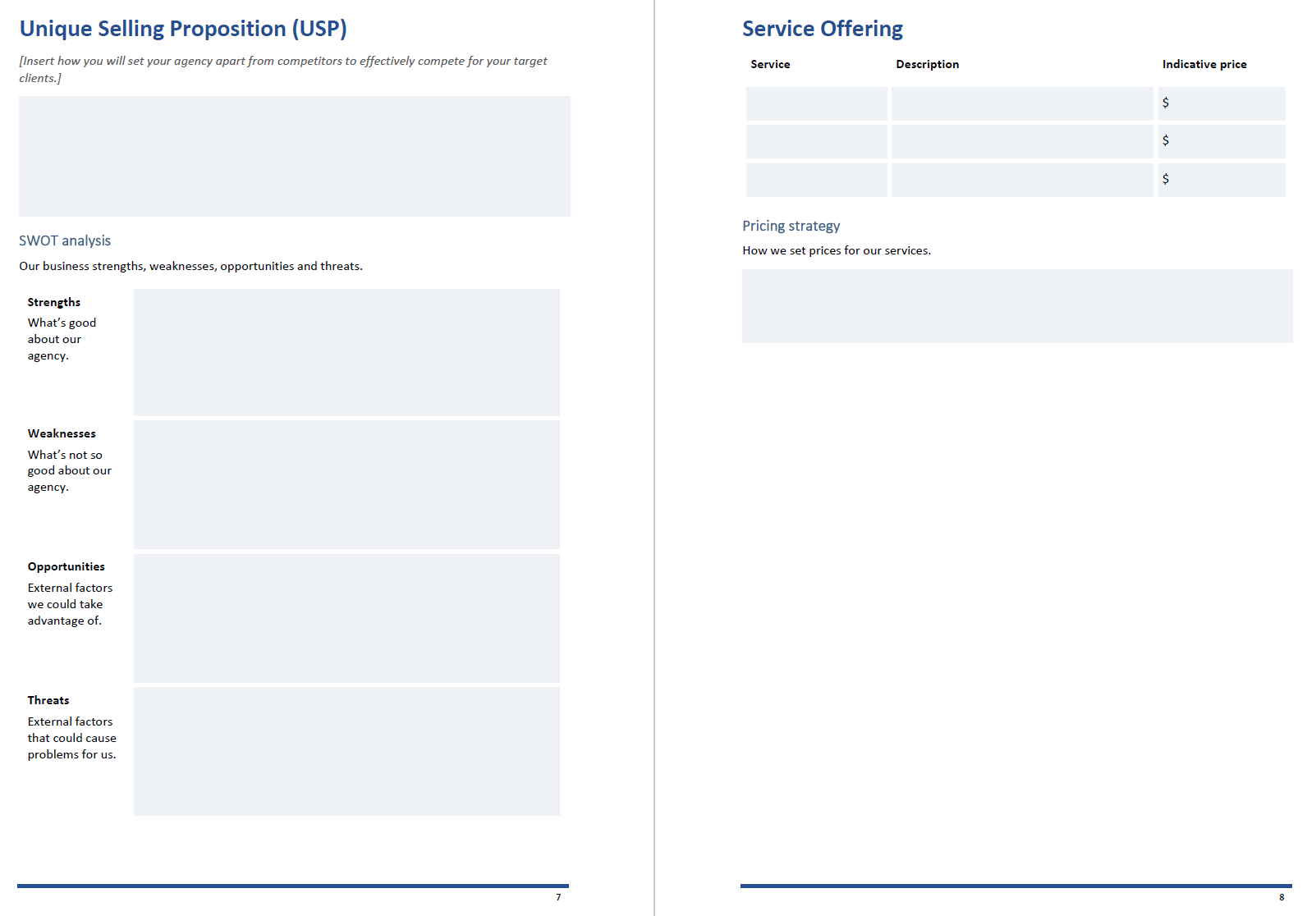
Go-To-Market (GTM) Plan and Org Structure
Define your target market - the exact client types who you want to sell to and list the marketing and advertising activities that you will perform that would be most effective in reaching these types of people.
Also list your people (this might not be many on day 1!), sources of advice and support as well as the strategies you'll use to retain your staff and build their skills and knowledge.
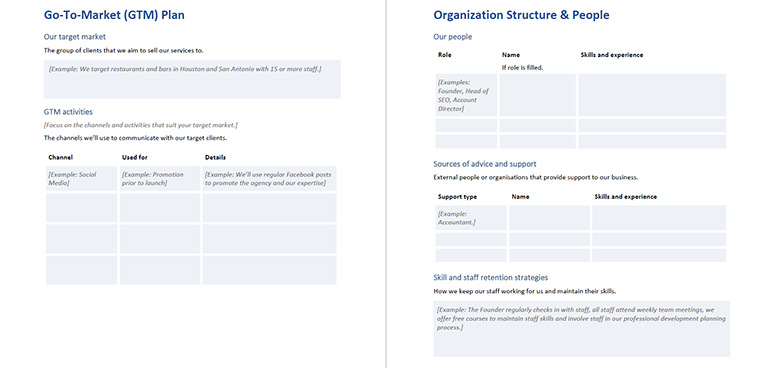
Goals Sales Forecasting
This marketing agency business plan template includes goal setting for the next year and goal setting for the next 3 years. This page is structured to help you set SMART goals.
SMART goals are:
- Specific: In the '[Enter a goal]' section describe your goal clearly and ensure you attach a person responsible in the 'Who's responsible' section.
- Measureable: Ensure the actions you list in the 'Actions to achieve goal' have an objective outcome
- Achievable: Ensure you sense-check your goals with your team and all agree that they are attainable
- Relevant: Ensure this is a priority goal and will help your new agency grow
- Time-bound: Enter a due date to ensure the goal doesn't get forgotten
Use the Cash flow forecast table as a simple way to visualize cash-on-hand in your first 12 months. Add rows to estimate your monthly expenses like payroll, rent, utilities, subscriptions, insurance, fees and other ongoing costs.
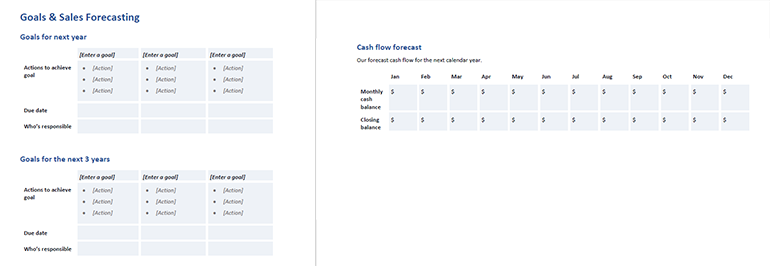
Tools and Tech
Finally, list out all the tools and technology your new agency will likely need to run an efficient operation. We've listed SEOptimer for you already because it's one of the best, low-cost lead generation tools for your agency. Over 2,000 digital agencies use SEOptimer to generate white label site audits and embed an audit form on their agency website to capture new lead details.
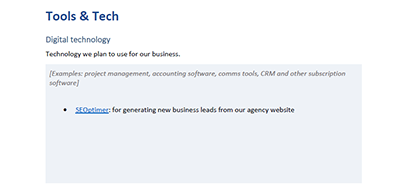
Creative Agency Business Plan Slide Deck PPTX Template
If you prefer a slide deck template, use this creative agency business plan example in PowerPoint format:
